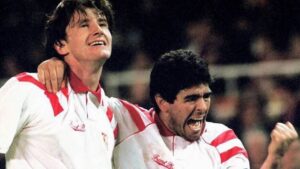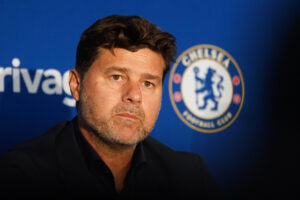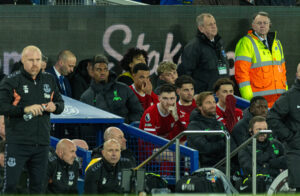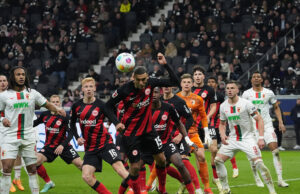Just when it seemed that Arsenal’s wretched season was completely fizzling out after the non-performance against Villareal in the Europa League semi-final, Mikel Arteta and his side have a new prize to aim for. Going into the final game of the Premier League season, Arteta knows that if Arsenal can beat Brighton & Hove Albion at home and Tottenham Hotspur and Everton fail to win their respective matches, then Arsenal can ascend to the sunlit uplands of seventh place and qualify for UEFA’s newly created European competition, the Europa Conference League.
Mikel Arteta Aiming for an Unmagnificent Seventh
The Europa Conference League – or ‘Europa Vase’?
Such scoffing is easy after Arsenal have performed so consistently poorly throughout the season. The third-tier Europa Conference League has already been widely dubbed ‘The Europa Vase’ by many Arsenal fans, who see it as no consolation for such a stunningly under-performing year. Indeed, some have even expressed the view that for once they would rather finish below Spurs and have no European competition at all, so that Arteta can have more time next season, without midweek European fixtures, to coach the team, especially the defence, and improve their Premier League performance.
Nevertheless, although it could hardly be described as magnificent, finishing seventh, one place higher than last season, would provide Arteta with the one tangible sign that he has achieved some progress this season. It would also mean that, against all the odds and even if it meant somehow persuading UEFA to create a new competition especially for them, Arsenal would maintain their quarter-century run of qualifying for European competition. But far more importantly, it would also mean that the Gunners would finally have shown some consistency at the end of an utterly inconsistent season, by winning five league games in a row, which was virtually unthinkable after the Europa League capitulation. It might even provide some much-needed impetus for next season.
Arsenal’s Complete Lack of Consistency
It is maintaining consistency of performance that has been Arteta’s biggest problem since he took over at Arsenal in December 2019. Although there have been some outstanding displays, especially winning the FA Cup semi-final and final last season against the Premier League’s twin oil giants Manchester City and Chelsea, there have been many more poor displays, culminating in the vapid performance against Villareal.
However, consistency of performance is aided by consistency of selection, and the lack of such selection might be an even bigger stick to beat Arteta with. More than 18 months into his time as Arsenal manager, he is still to impose a settled style or even a settled formation on his team. In addition, he has recently proven prone to conducting astonishingly bad, or at least extremely risky, experiments, such as those against Villareal in both legs of the semi-final (playing with a false nine and a one-man midfield respectively), which have only undermined his team’s and his fans’ confidence in him.
Of course, Arteta is still an extremely inexperienced manager, who has been in the unenviable position of becoming the first manager of a big – or at least well-supported – club not to have enjoyed the benefit of a large home crowd behind him, cheering him and the team on and pressurising officials for ‘home’ decisions, which the year of pandemic football has proved is most definitely a factor in football and indeed all sport. Also, the devastating blow of failing to reach the Europa League Final, against a team led by the manager he had replaced, may finally have led Arteta to a belated awakening as to what he really needs to do at Arsenal.
Managing the Players Mikel Arteta Has
Put simply, Arteta must now manage what he has, utilising the players that he already has at his disposal, including those he has sent out on loan, rather than idly dreaming of ever assembling the kind of multi-billion pound side that he had the luxury of coaching at Manchester City. And the relative parsimony of the Kroenke family, at least in comparison with most other members of the Big Six, plus the cold, hard economics of the pandemic mean that it is almost certain that he will not have much money to spend in the summer transfer window anyway.
There is the basis of a much better Arsenal side than the one that has been on display for most of this season – the proverbial good (or at least significantly improved) team struggling to get out of a bad, bloated and imbalanced squad. In particular, the young players at Arsenal, who have experienced so much disappointment this season, may ultimately be fortified by it.
The defence continues to need strengthening, as it has for more than a decade and a half. However, Kieran Tierney, if he can stay fit, is a born leader. And hopefully, Arteta can reconsider his apparent dismissal of both William Saliba and Ainsley Maitland-Niles, who can play at full-back if necessary, to instantly bolster the defensive options available to him.
In midfield, it can only be hoped that Thomas Partey, after a summer’s break and a proper pre-season, will finally begin to display the form that not only persuaded Arteta to sign him from Atletico Madrid but, far more importantly, persuaded the ultra-demanding Diego Simeone to include him in his Atletico side in the first place. Alongside him, Joe Willock surely deserves to be given another chance at Arsenal after his record goal-scoring form at Newcastle United. During his loan period in the northeast, Willock seems to have grown an inch or two in height and stature, as a result of the confidence invested in him by Steve Bruce, so Arteta should try and follow suit. Certainly, the performances of both Willock and Maitland-Niles in midfield while they have been on loan have proved that they should be given another chance at Arsenal, ahead of the consistently under-performing Granit Xhaka, the on-loan Dani Ceballos and the simply-not-good-enough Mohamed Elneny.
However, the real source of hope for Arsenal fans is up front, where the club do have resources that even some other top clubs would envy. Gabriel Martinelli’s match-winning entry against Crystal Palace proves that he, too, should be given an extended run in the team, even ahead of the veteran strikers Pierre-Emerick Aubameyang and Alexandre Lacazette. And behind him, an attacking trio or ‘trident’ of Bukayo Sako, Emile Smith Rowe and Nicolas Pepe, who is finally beginning to show that he is at least a £30 million player even if he might be ultimately unable to prove worthy of the £72 million paid for him, can provide the assists that any striker needs.
And No More Loanees or ‘Chelski Penskioners’
Most importantly, perhaps, Arteta should abandon the two supposed ‘get-fixed-quick’ approaches that have bedevilled Arsenal in recent years, indeed ever since Arsene Wenger’s belated departure. There should be no more loanees: Ceballos can go back to Real Madrid, after two largely disappointing seasons on loan at Arsenal; and Martin Ødegaard can stay, but only if Real will agree a reasonable transfer fee for him. And there should certainly be no more “Chelski Penskioners”, such as David Luiz and Willian (and Petr Cech before them). Henceforth, Arteta should only work with players who are fully committed to Arsenal, in a way that loanees never can be, and players who have not already been rejected by an obvious rival.
Finally, Mikel Arteta must show that he has learned from this most difficult and unpredictable of all seasons. If, as now seems likely, he will be given a chance to finally manage a team following a full pre-season and summer transfer window, in which there must be no major doubts about any new recruits he is able to sign, then he must decide on a settled formation and a settled style of play. Hopefully, they can finally lead to some form of settled, steady progress at Arsenal after too many years of drift.
Main Photo






